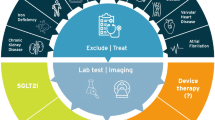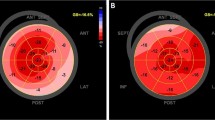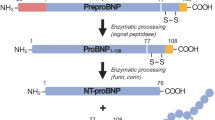Abstract
Diabetes mellitus, a disease which is increasing in prevalence, is a major risk factor for coronary heart disease. In patients following acute myocardial infarction, the presence of diabetes is a powerful risk factor for the development of heart failure, and this intersection of heart failure and diabetes following myocardial infarction carries substantial risk. The poor prognosis associated with heart failure in diabetic patients following myocardial infarction is likely multifactorial. Aggressive strategies for prevention and treatment of heart failure are crucial to reducing the risk associated with diabetes and heart failure following myocardial infarction. This review summarizes epidemiologic, pathophysiologic, and therapeutic data related to diabetes and heart failure in the post-myocardial infarction setting.
Similar content being viewed by others
References and Recommended Reading
Wild S, Roglic G, Green A, et al.: Global prevalence of diabetes: estimates for the year 2000 and projections for 2030. Diabetes Care 2004, 27:1047–1053.
Narayan KM, Boyle JP, Thompson TJ, et al.: Lifetime risk for diabetes mellitus in the United States. JAMA 2003, 290:1884–1890.
Grundy SM, Benjamin IJ, Burke GL, et al.: Diabetes and cardiovascular disease: a statement for healthcare professionals from the American Heart Association. Circulation 1999, 100:1134–1146.
Gheorghiade M, Bonow RO: Chronic heart failure in the United States: a manifestation of coronary artery disease. Circulation 1998, 97:282–289.
O’Connor CM, Hathaway WR, Bates ER, et al.: Clinical characteristics and long-term outcome of patients in whom congestive heart failure develops after thrombolytic therapy for acute myocardial infarction: development of a predictive model. Am Heart J 1997, 133:663–673.
Steg PG, Dabbous OH, Feldman LJ, et al.: Determinants and prognostic impact of heart failure complicating acute coronary syndromes: observations from the Global Registry of Acute Coronary Events (GRACE). Circulation 2004, 109:494–499.
Velazquez EJ, Francis GS, Armstrong PW, et al.: An international perspective on heart failure and left ventricular systolic dysfunction complicating myocardial infarction: the VALIANT registry. Eur Heart J 2004, 25:1911–1919.
Wu AH, Parsons L, Every NR, et al.: Hospital outcomes in patients presenting with congestive heart failure complicating acute myocardial infarction: a report from the Second National Registry of Myocardial Infarction (NRMI-2). J Am Coll Cardiol 2002, 40:1389–1394.
Lewis EF, Moye LA, Rouleau JL, et al.: Predictors of late development of heart failure in stable survivors of myocardial infarction: the CARE study. J Am Coll Cardiol 2003, 42:1446–1453.
Murcia AM, Hennekens CH, Lamas GA, et al.: Impact of diabetes on mortality in patients with myocardial infarction and left ventricular dysfunction. Arch Intern Med 2004, 164:2273–2279. Report from the SAVE trial highlighting the adverse impact of diabetes in survivors of acute MI complicated by LV dysfunction.
Das SR, Drazner MH, Yancy CW, et al.: Effects of diabetes mellitus and ischemic heart disease on the progression from asymptomatic left ventricular dysfunction to symptomatic heart failure: a retrospective analysis from the Studies of Left Ventricular Dysfunction (SOLVD) Prevention trial. Am Heart J 2004, 148:883–888.
Aguilar D, Solomon SD, Kober L, et al.: Newly diagnosed and previously known diabetes mellitus and 1-year outcomes of acute myocardial infarction: the VALsartan In Acute myocardial iNfarcTion (VALIANT) trial. Circulation 2004, 110:1572–1578.
Malmberg K, Ryden L, Hamsten A, et al.: Effects of insulin treatment on cause-specific one-year mortality and morbidity in diabetic patients with acute myocardial infarction. DIGAMI Study Group. Diabetes Insulin-Glucose in Acute Myocardial Infarction. Eur Heart J 1996, 17:1337–1344.
Granger CB, Califf RM, Young S, et al.: Outcome of patients with diabetes mellitus and acute myocardial infarction treated with thrombolytic agents. The Thrombolysis and Angioplasty in Myocardial Infarction (TAMI) Study Group. J Am Coll Cardiol 1993, 21:920–925.
Mak KH, Moliterno DJ, Granger CB, et al.: Influence of diabetes mellitus on clinical outcome in the thrombolytic era of acute myocardial infarction. GUSTO-I investigators. Global Utilization of Streptokinase and Tissue Plasminogen Activator for Occluded Coronary Arteries. J Am Coll Cardiol 1997, 30:171–179.
Woodfield SL, Lundergan CF, Reiner JS, et al.: Angiographic findings and outcome in diabetic patients treated with thrombolytic therapy for acute myocardial infarction: the GUSTO-I experience. J Am Coll Cardiol 1996, 28:1661–1669.
Stone PH, Muller JE, Hartwell T, et al.: The effect of diabetes mellitus on prognosis and serial left ventricular function after acute myocardial infarction: contribution of both coronary disease and diastolic left ventricular dysfunction to the adverse prognosis. The MILIS Study Group. J Am Coll Cardiol 1989, 14:49–57.
Prasad A, Stone GW, Stuckey TD, et al.: Impact of diabetes mellitus on myocardial perfusion after primary angioplasty in patients with acute myocardial infarction. J Am Coll Cardiol 2005, 45:508–514. An interesting substudy of the CADILLAC trial showing that patients with diabetes are more likely than patients without diabetes to have abnormal indices of myocardial perfusion following primary percutaneous coronary interventions in the acute MI setting.
Fang ZY, Prins JB, Marwick TH: Diabetic cardiomyopathy: evidence, mechanisms, and therapeutic implications. Endocr Rev 2004, 25:543–567. An excellent review summarizing and evaluating the existence of the diabetic cardiomyopathy and exploring mechanistic and potential therapeutic implications.
Asbun J, Villarreal FJ: The pathogenesis of myocardial fibrosis in the setting of diabetic cardiomyopathy. J Am Coll Cardiol 2006, 47:693–700.
Carrabba N, Valenti R, Parodi G, et al.: Left ventricular remodeling and heart failure in diabetic patients treated with primary angioplasty for acute myocardial infarction. Circulation 2004, 110:1974–1979. In diabetic patients presenting with acute MI, adverse remodeling (LV enlargement) does not account for the increased incidence of HF in diabetic patients. Echocardiographic abnormalities of diastolic function appear to be contributing.
Solomon SD, St John Sutton M, Lamas GA, et al.: Ventricular remodeling does not accompany the development of heart failure in diabetic patients after myocardial infarction. Circulation 2002, 106:1251–1255.
St John Sutton M, Pfeffer MA, Plappert T, et al.: Quantitative two-dimensional echocardiographic measurements are major predictors of adverse cardiovascular events after acute myocardial infarction. The protective effects of captopril. Circulation 1994, 89:68–75.
An D, Rodrigues B: The role of changes in cardiac metabolism in the development of diabetic cardiomyopathy. Am J Physiol Heart Circ Physiol 2006, 291:H1489-H1506. An excellent review of cardiac metabolism and abnormalities of cardiac metabolism associated with diabetes.
Finck BN: The role of the peroxisome proliferators-activated receptor alpha pathway in pathological remodeling of the diabetic heart. Curr Opin Clin Nutr Metab Care 2004, 7:391–396.
Young ME, McNulty P, Taegtmeyer H: Adaptation and maladaptation of the heart in diabetes: Part II: potential mechanisms. Circulation 2002, 105:1861–1870.
Finck BN, Lehman JJ, Leone TC, et al.: The cardiac phenotype induced by PPARalpha overexpression mimics that caused by diabetes mellitus. J Clin Invest 2002, 109:121–130.
Nystrom T, Nygren A, Sjoholm A: Increased levels of tumour necrosis factor-alpha (TNF-alpha) in patients with Type II diabetes mellitus after myocardial infarction are related to endothelial dysfunction. Clin Sci (Lond) 2006, 110:673–681.
Giacchetti G, Sechi LA, Rilli S, et al.: The rennin-angiotensin-aldosterone system, glucose metabolism and diabetes. Trends Endocrinol Metab 2005, 16:120–126.
Burger AJ, Aronson D: Blunted sympathetic response in diabetic patients with decompensated congestive heart failure. Int J Cardiol 2001, 81:243–249.
Suleiman M, Aronson D, Asleh R, et al.: Haptoglobin polymorphism predicts 30-day mortality and heart failure in patients with diabetes and acute myocardial infarction. Diabetes 2005, 54:2802–2806. An interesting prospective study that demonstrates that a genetic polymorphism may modify the effect of diabetes on HF following acute MI.
Thomas KL, Velazquez EJ: Therapies to prevent heart failure post-myocardial infarction. Curr Heart Fail Rep 2005, 2:174–182.
Smith SC Jr, Allen J, Blair SN, et al.: AHA/ACC guidelines for secondary prevention for patients with coronary and other atherosclerotic vascular disease: 2006 update: endorsed by the National Heart, Lung, and Blood Institute. Circulation 2006, 113:2363–2372.
Gustafsson I, Torp-Pedersen C, Kober L, et al.: Effect of the angiotensin-converting enzyme inhibitor trandolapril on mortality and morbidity in diabetic patients with left ventricular dysfunction after acute myocardial infarction. Trace Study Group. J Am Coll Cardiol 1999, 34:83–89.
Pfeffer MA, McMurray JJ, Velazquez EJ, et al.: Valsartan, captopril, or both in myocardial infarction complicated by heart failure, left ventricular dysfunction, or both. N Engl J Med 2003, 349:1893–1906.
Shindler DM, Kostis JB, Yusuf S, et al.: Diabetes mellitus, a predictor of morbidity and mortality in the Studies of Left Ventricular Dysfunction (SOLVD) Trials and Registry. Am J Cardiol 1996, 77:1017–1020.
Dargie HJ: Effect of carvedilol on outcome after myocardial infarction in patients with left-ventricular dysfunction: the CAPRICORN randomised trial. Lancet 2001, 357:1385–1390.
Haas SJ, Vos T, Gilbert RE, et al.: Are beta-blockers as efficacious in patients with diabetes mellitus as in patients without diabetes mellitus who have chronic heart failure? A meta-analysis of large-scale clinical trials. Am Heart J 2003, 146:848–853.
Bakris GL, Fonseca V, Katholi RE, et al.: Metabolic effects of carvedilol vs metoprolol in patients with type 2 diabetes mellitus and hypertension: a randomized controlled trial. JAMA 2004, 292:2227–2236.
Poole-Wilson PA, Swedberg K, et al.: Comparison of carvedilol and metoprolol on clinical outcomes in patients with chronic heart failure in the Carvedilol Or Metoprolol European Trial (COMET): randomised controlled trial. Lancet 2003, 362:7–13.
Malmberg K, Norhammar A, Wedel H, et al.: Glycometabolic state at admission: important risk marker of mortality in conventionally treated patients with diabetes mellitus and acute myocardial infarction: long-term results from the Diabetes and Insulin-Glucose Infusion in Acute Myocardial Infarction (DIGAMI) study. Circulation 1999, 99:2626–2632.
Malmberg K: Prospective randomised study of intensive insulin treatment on long term survival after acute myocardial infarction in patients with diabetes mellitus. DIGAMI (Diabetes Mellitus, Insulin Glucose Infusion in Acute Myocardial Infarction) Study Group. BMJ 1997, 314:1512–1515.
Malmberg K, Ryden L, Wedel H, et al.: Intense metabolic control by means of insulin in patients with diabetes mellitus and acute myocardial infarction (DIGAMI 2): effects on mortality and morbidity. Eur Heart J 2005, 26:650–661. A multicenter, prospective randomized trial did not show mortality benefit with the acute introduction of a long-term insulin treatment strategy in patients with diabetes and acute MI.
Gustafsson I, Hildebrandt P, Seibaek M, et al.: Long-term prognosis of diabetic patients with myocardial infarction: relation to antidiabetic treatment regimen. The TRACE Study Group. Eur Heart J 2000, 21:1937–1943.
Ingelsson E, Sundstrom J, Arnlov J, et al.: Insulin resistance and risk of congestive heart failure. JAMA 2005, 294:334–341.
Nesto RW, Bell D, Bonow RO, et al.: Thiazolidinedione use, fluid retention, and congestive heart failure: a consensus statement from the American Heart Association and American Diabetes Association. October 7, 2003. Circulation 2003, 108:2941–2948.
Masoudi FA, Inzucchi SE, Wang Y, et al.: Thiazolidinediones, metformin, and outcomes in older patients with diabetes and heart failure: an observational study. Circulation 2005, 111:583–590. A larger, observational study of diabetic Medicare beneficiaries that demonstrated that TZDs and metformin were not associated with increased mortality and may improve overall outcome in patients discharged from the hospital with HF.
Inzucchi SE, Masoudi FA, Wang Y, et al.: Insulin-sensitizing antihyperglycemic drugs and mortality after acute myocardial infarction: insights from the National Heart Care Project. Diabetes Care 2005, 28:1680–1689. In a large observational study of diabetic Medicare beneficiaries following acute MI, the use of TZDs was associated with a mildly increased risk of admission for HF.
Rosano GM, Vitale C, Sposato B, et al.: Trimetazidine improves left ventricular function in diabetic patients with coronary artery disease: a double-blind placebo-controlled study. Cardiovasc Diabetol 2003, 2:16.
Nikolaidis LA, Elahi D, Hentosz T, et al.: Recombinant glucagons-like peptide-1 increases myocardial glucose uptake and improves left ventricular performance in conscious dogs with pacing-induced dilated cardiomyopathy. Circulation 2004, 110:955–961.
Author information
Authors and Affiliations
Corresponding author
Rights and permissions
About this article
Cite this article
Estep, J.D., Aguilar, D. Diabetes and heart failure in the post-myocardial infarction patient. Curr Heart Fail Rep 3, 164–169 (2006). https://doi.org/10.1007/s11897-006-0017-7
Issue Date:
DOI: https://doi.org/10.1007/s11897-006-0017-7




